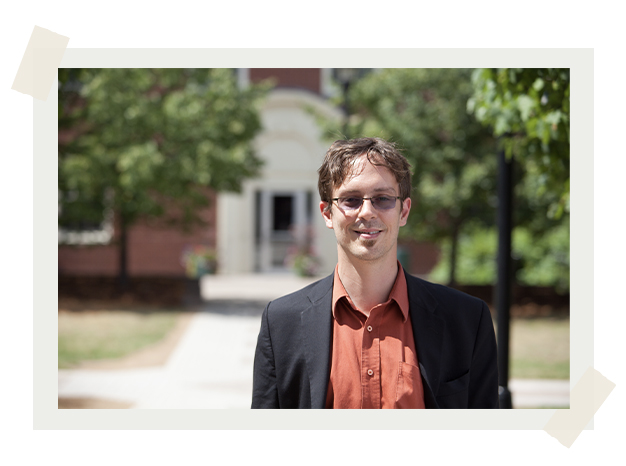English Language and Literature
English Language and Literature is about more than reading—it’s about learning, through texts, to read the world we live in and understand the linguistic mechanisms that shape us.
English Language and Literature at STU
Our courses introduce the vital practices of critical reading, writing about ideas and texts, and collaborative learning through discussion and debate. They explore themes like history, culture, theatre, film, technology, and media—old and new—as well as digital literacy. Students are also able to complete a concentration in Creative Writing, which sharpens skills in style and strategy and offers several prizes and publication opportunities.


“STU’s commitment to liberal arts helps make the classrooms thoughtful and dynamic—students bring insights from other fields that they are learning about, and the learning communities they inform enrich the classroom dynamic.”
– Dr. Matte Robinson, Chair of English Language and Literature at STU

What sets STU’s English Language and Literature Program Apart?
- An optional concentration in Creative Writing allows students to engage with texts creatively—to produce them and to hear readings by established authors and writers among their peers. The concentration sharpens skills in style and strategy and offers several prizes and publication opportunities. Learn more
- Lectures and seminars are always taught by professors—not teaching assistants—which means students learn from experts in the field.
- Course offerings range from traditional topics to media—old and new—as well as digital literacy.
- Students benefit from faculty expertise in film, theatre studies, Canadian literature, American literature, Medieval studies, ecocriticism, Old English, monstrosity and bodies, digital literacy, and more.
Where the Study of English Language and Literature Can Take You
Students in English develop advanced skills in reading, writing, research, and communication. Through the study of various materials—medieval manuscripts, Elizabethan plays, novels, poems, and video games—students hone their ability to think critically and analyze information.
This prepares graduates for meaningful careers in fields like:
- Education
- Publishing
- Journalism
- Law
- Event Management
- Business
- Theatre
 “I met amazing people who challenged everything I thought I understood about art, life, myself, the ways we relate to each other, and the many human experiences. I don’t know if I would have gained the insight I needed to grow if I hadn’t come to STU and learned how to hear what people are really saying."
“I met amazing people who challenged everything I thought I understood about art, life, myself, the ways we relate to each other, and the many human experiences. I don’t know if I would have gained the insight I needed to grow if I hadn’t come to STU and learned how to hear what people are really saying."
Jamie Kitts, BA ’19, English with a concentration in Creative Writing
Pursuing a Masters in Creative Writing

Gain Experience and Build Your Resume
In the Advanced Old English: Literature and Landscape course, students travel to the United Kingdom with their professor to use the culture, geography, geology, and history of their surroundings as course material to enhance their learning.
Connect the study of English Language and Literature with professional experience through the STU's Internship Program in positions with:
- Goose Lane Editions
- Learning Disabilities Association of New Brunswick
- Theatre New Brunswick
- The Dennis Report
- Solo Chicken Productions
You might be interested in studying English Language and Literature if…
- You care about the issues affecting society today and want to intervene in a meaningful way.
- You love to read and write
- You want a deeper understanding of the world around you
Featured Courses
English Literatures in History and Culture
Reading and Responding to Indigenous Canadian Literatures
Manga and Graphic Novels
Reading Popular Culture
Fields That Enhance Your Learning in English Language and Literature
English students are often interested in academic fields that require reading, analysis, research, and the process of developing compelling, coherent arguments—areas such as History, Great Books, Philosophy, or Journalism. You may also be interested in areas that relate to the human experience and behaviour, like Psychology, Gerontology, Anthropology, and Criminology.